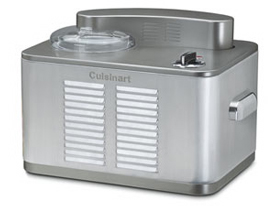The recent recall of both Blue Bunny Ice cream and Jeni ice cream raised an interesting question – how is it that this bug can grow in ice cream? What are the symptoms? Why should pregnant women avoid this ice cream?

How does Listeria grow in ice cream?
Listeria can survive in freezers and cold quite well, it doesn’t grow in frozen temperatures, but it survives there. This means that there was a lot of contamination at the manufacturer, at some point in the process.
When Ice cream is made they use milk, and eggs which are both great food for Listeria bacteria, among others. Even if the milk is pasteurized, if it is contaminated in the process from the machinery then there is an issue. If these products are contaminated, the bacteria can quickly grow and will survive freezing temperatures. They won’t grow in the freezer, but they won’t die either.
How bad is Listeria?
If a person becomes infected with the bug, and it takes a lot of bugs to do this, unlike E coli or salmonella – about 1/3 of them die. Pregnant woman are highly susceptible to this bug, and it is a cause of miscarriage.
What other foods can be contaminated?
Raw dairy products are the most common. Raw milk, unpasteurized cheeses, especially soft cheeses. There have been outbreaks associated with deli meats (leading to new treatment of meats with lactic acid). Some processed fruits have been associated with outbreaks also: A 2011 outbreak that sickened 147 was tied to cantaloupe, according to the CDC. And in late 2014, prepackaged caramel apples sickened 35 people with listeriosis, 34 of whom had to be hospitalized, according to the CDC.
Pregnant women are advised to avoid soft cheeses, deli meats, and only to eat fruits if you have to peel them.
What are the symptoms?
They are fever, vomiting, diarrhea, stiff neck, and can go on to develop a meningitis. It takes 3 days to 1 month (and sometimes 3 months) to develop symptoms as the bacteria can “hide” from the immune system for a while. It is easily treated, once diagnosed, with antibiotics. However, people who are immune compromised, such as infants, people with transplants, and pregnant women are at risk.
What can you do to avoid Listeria?
Ice cream goes through a process before it is frozen, where the ingredients are mixed in large containers. If during that process the dairy products are contaminated, or a source of the ingredients are contaminated, you won’t know it without testing. Since now there are two companies that have recalled based on testing, there is probably a common source for the ingredients.
At home: if food is left out for two hours or more, throw it out. Even pasteurized milk and other dairy products after two hours can have a thriving culture of bacteria that can infect.
The worst problem is unpasteurized dairy products. In spite of the movement to bring unpasteurized cheese or milk this should be avoided especially with pregnant women and children. Avoid deli meats and soft – unpasteurized – cheese. Do not eat processed fruits, but only fruits you can peel.
Right now, with the concerns about the emulsifiers in ice cream, and now the increased concern for Listeria, the only ice cream you have should be the kind you make at home.

